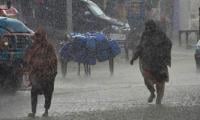PESHAWAR: The National Commission on Human Rights (NHCR), Khyber Pakhtunkhwa chapter, has expressed concern over exclusion of under-18 prisoners from the Juvenile Justice System in the prisons in the province.
“The NCHR is extremely disturbed by the fact that in KP prisons, a number of children who are under 18 years of age were excluded from the Juvenile Justice System. The children under the age of 18 are required to face the regular justice system in the prisons now as they are being denied the status as children,” revealed a study report of NHCR-KP on Juvenile Justice System in Khyber Pakhtunkhwa.
The report was prepared in the light of visits to courts, prisons, prosecution, probation/parole, police academies, police stations, bar councils, committees working under the Police Order 2002, child and women shelter homes and Dispute Resolution Councils.
It was revealed in the report that the children were being denied the right of juvenile, which is a violation of the law.
As per the report, the NHCR stated that the law holds that children are subject to criminal prosecution starting at the age of 15 to 16 due to non-availability of age determination certificate, but in most courts of the province the children have been prosecuted under the Juvenile Justice System without age determination.
“The NCHR considers that whenever a person is not 18 years of age at the time of the commission of the offence, he or she must be treated in accordance with the rules of the special Juvenile Justice System. The system has been enforced in 2000 but its articles have not been fully implemented as required under the international obligations,” the NCHR stated in the report.
In Khyber Pakhtunkhwa, there are 338 young alleged offenders. Among them, 311 are under trial while 27 are convicted. There is no data available on the female juvenile prisoners in KP.
Under the Juvenile Justice System Ordinance 2000, a child means a person who at the time of commission of an offence has not attained the age of 18 years.
Deputy Director NCHR KP, Rahat Ali, when contacted by The News, informed that his office prepared the study report for highlighting the issue. He added that recommendations were made to the government to address this issue and also violation of the rights of the juveniles in the province.
“International law has clearly established the age of adulthood at 18. Therefore, NCHR should consider the matter that if the body of evidence in a given case shows that the accused had not yet turned 18 at the time the alleged offence was committed, then the juvenile criminal justice system must apply,” he argued.
He explained that the Committee on the Rights of the Child has stated that it wishes to remind states that they have recognised the right of every child alleged as, accused of, or recognised as having infringed the penal law to be treated in accordance with the provisions of Article 40 of CRC. He added this means that every person under the age of 18 years at the time of the alleged commission of an offence must be treated in accordance with the rules of juvenile justice.
According to the information the NCHR KP office has received, he some children under the age of 18 in the region are barred from the juvenile justice system.
He pointed out that children have been denied their freedom and held under the same conditions as adults despite the fact that under international law only those over 18 years of age can be held criminally responsible as adults.
However, he said, the NCHR KP is encouraging the state organs to adopt domestic laws regulating prosecution and sentencing in the case of young people over the age of 18 who are convicted of offences committed while still minors so that they are not moved automatically into the adult prison system simply because they turn 18.
He said the NCHR noted that when the state apparatus has to intervene in offences committed by children, it should make substantial efforts to guarantee their rehabilitation in order to “allow them to play a constructive and productive role in society.” However, he noted that this procedure is not followed.
The NCHR advocated taking necessary steps including amendment, reformation and accommodation of international human rights laws in the local and national laws.
Volunteers are busy in rescue operation due to stagnant rainwater at Sardar Colony in Peshawar on April 15, 2024. —...
Police personnel can be seen standing guard on a road in KP. — AFP/FilePESHAWAR: A police constable was injured when...
Commuters face difficulties in transportation due to stagnant rainwater in Peshawar on April 15, 2024. —...
This photo shows the flames of a lit burner of a gas stove. — AFP/FileISLAMABAD: In a major development, the sitting...
In this picture women check rice prices at a main wholesale market. — AFP/FileMULTAN: The Pakistan Business Forum ,...
Pakistan People’s Party Chairman Bilawal Bhutto Zardari gestures during an event on March 8, 2024. —...







